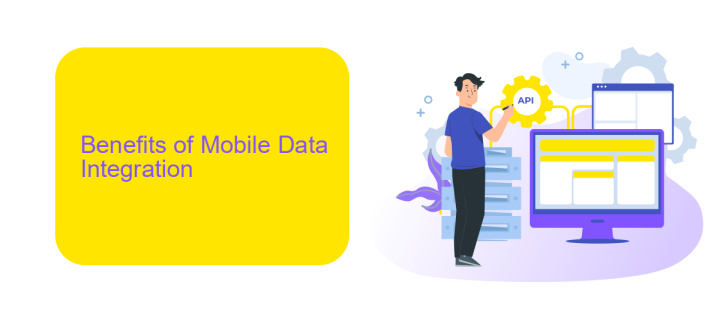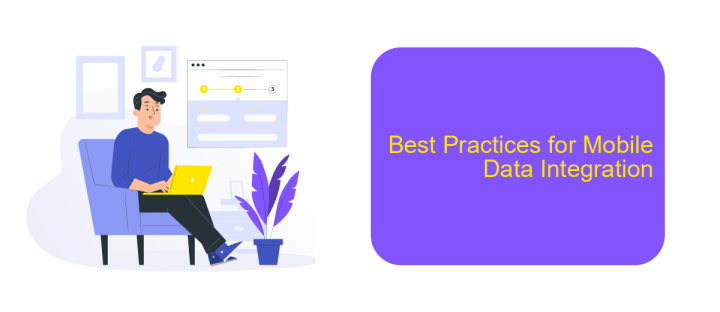Mobile Data Integration
Mobile Data Integration is a crucial aspect of modern technology, enabling seamless connectivity and data exchange across various platforms and devices. As the use of mobile devices continues to surge, integrating data from diverse sources becomes essential for businesses to maintain efficiency, enhance user experience, and drive innovation. This article explores the key strategies and benefits of effective mobile data integration.
Introduction
Mobile data integration is a critical component in today's digital landscape, enabling seamless communication between various applications and platforms. By integrating mobile data, businesses can enhance their operational efficiency, improve customer experiences, and make data-driven decisions more effectively.
- Streamlined data synchronization across multiple devices
- Real-time data access and updates
- Enhanced data security and compliance
- Improved customer engagement and personalization
One of the notable services facilitating mobile data integration is ApiX-Drive. This platform allows businesses to connect various applications and automate data transfer processes without the need for extensive coding. By leveraging tools like ApiX-Drive, companies can ensure that their mobile data integration is both efficient and reliable, ultimately driving better business outcomes.
Benefits of Mobile Data Integration

Mobile data integration offers numerous benefits, significantly enhancing the efficiency and effectiveness of business operations. By seamlessly merging data from various mobile applications and devices, organizations can achieve a unified view of their data, leading to better decision-making and strategic planning. This integration allows for real-time data access, ensuring that businesses can respond swiftly to market changes and customer needs. Furthermore, it reduces data silos, enabling smoother communication and collaboration across different departments.
Another key advantage is the automation of data workflows, which minimizes manual data entry and the risk of human error. Tools like ApiX-Drive facilitate this process by providing easy-to-use platforms for setting up and managing integrations without the need for extensive coding knowledge. This not only saves time but also ensures that the data is consistently accurate and up-to-date. Additionally, mobile data integration enhances customer experiences by providing personalized and timely interactions, ultimately driving customer satisfaction and loyalty.
Challenges of Mobile Data Integration

Mobile data integration presents a set of unique challenges that can hinder seamless data flow across various platforms. These challenges stem from the inherent complexities of mobile environments, diverse data formats, and the need for real-time data synchronization.
- Data Security: Ensuring secure transmission and storage of data is paramount, especially given the increasing number of cyber threats targeting mobile devices.
- Data Consistency: Maintaining data consistency across multiple devices and platforms can be difficult due to varying network conditions and device capabilities.
- Scalability: As mobile applications grow, the integration solutions must scale efficiently to handle increased data loads without compromising performance.
- Compatibility: Integrating data from diverse sources often involves dealing with different data formats and protocols, which can complicate the integration process.
- Real-Time Synchronization: Achieving real-time data synchronization is crucial for applications that rely on up-to-date information, but it can be challenging due to latency and network reliability issues.
To address these challenges, services like ApiX-Drive offer robust solutions for seamless mobile data integration. ApiX-Drive simplifies the integration process by providing a user-friendly interface and pre-built connectors for various data sources, ensuring secure and consistent data flow across platforms. By leveraging such services, businesses can overcome the complexities of mobile data integration and focus on delivering enhanced user experiences.
Best Practices for Mobile Data Integration

Integrating mobile data effectively requires a strategic approach to ensure seamless and secure data flow. One of the primary considerations is the choice of tools and platforms that facilitate smooth integration processes. Selecting a reliable service like ApiX-Drive can simplify the task by providing a user-friendly interface and extensive compatibility with various data sources.
Another crucial aspect is to ensure data security and privacy. Implementing robust encryption methods and complying with data protection regulations are essential steps to safeguard sensitive information. Regular audits and updates can help maintain the integrity of the data integration system.
- Choose a versatile integration platform like ApiX-Drive.
- Ensure robust data encryption and compliance with regulations.
- Perform regular system audits and updates.
- Monitor data flow to identify and resolve issues promptly.
By following these best practices, organizations can optimize their mobile data integration processes, ensuring efficient and secure data handling. Leveraging specialized services like ApiX-Drive can significantly enhance the ease and reliability of integrating diverse data sources into a unified system.
Conclusion
In conclusion, mobile data integration is a critical component for businesses aiming to streamline their operations and enhance data accessibility. By effectively integrating data from various mobile sources, organizations can achieve real-time insights, improve decision-making, and foster a more agile and responsive business environment. The challenges associated with mobile data integration, such as data fragmentation and security concerns, can be mitigated through robust integration platforms and best practices.
Services like ApiX-Drive play a pivotal role in simplifying the integration process, offering user-friendly interfaces and powerful automation capabilities. With ApiX-Drive, businesses can seamlessly connect diverse mobile applications and data sources, enabling a unified data ecosystem. As mobile technology continues to evolve, the importance of efficient data integration will only grow, making it essential for organizations to invest in reliable solutions that ensure data consistency, accuracy, and security across all platforms.
FAQ
What is Mobile Data Integration?
Why is Mobile Data Integration important?
How can I automate Mobile Data Integration?
What are the common challenges in Mobile Data Integration?
Can I integrate mobile data with my existing CRM system?
Time is the most valuable resource in today's business realities. By eliminating the routine from work processes, you will get more opportunities to implement the most daring plans and ideas. Choose – you can continue to waste time, money and nerves on inefficient solutions, or you can use ApiX-Drive, automating work processes and achieving results with minimal investment of money, effort and human resources.

